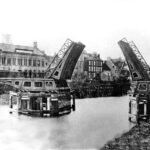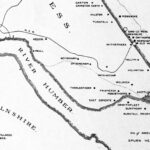13 November 1478: Edward IV orders the London merchant adventurers to allow their Yorkshire colleagues fair access to Low Countries markets for their woollen cloth
Maud Sellers. 1918. The York Mercers and Merchant Adventurers 1356-1917. Durham: Surtees Society. Get it:
.Unedited excerpt
If an excerpt is used in the book, it will be shorter, edited and, where applicable, translated.
To John Pickering [Pykkeryng] one of our courtmasters of this our realm haunting [frequenting] the parties off Flanders.
Trusty and well beloved, we greet you well, letting you wit [know] that no [now?] we late we have received a grievous complaint, showed unto us on the behalf of our well beloved subjects, the mercers of our city of York, towns of Hull, and Beverley, and Scarborough, and other places of the north parties of this our realm, containing among other things that ye, contrary to the ancient customs of old time, use, entreat, and demean them, coming into those parties of Flanders for fete [fairs] of merchandise, unto their great loss, hurt, and prejudice, as all at large is expressed in the said complaint, whereof we send you a copy, enclosed within these our letters. Wherefore, we woull [?] and also straightly charge you, that from henceforth ye demean and entreat the said mercers in those parts beyond the see, with all favour and honesty, according to the said ancient customs, so and in such wise as they have no cause to complain eftsoons [again]. And unto the time that ye have showed or make to be showed before us, and our said counsel, sufficiently the cause why they ought not so to be entreated, not failing herein as ye lust to do us singular pleasure, and would answer to us at your peril. Given under our privy seal, at our palace of Westminster, the 13th day of November, [1478].
Comment
Comment
Anne Sutton summarises the complaint of the northerners against Merchants of the Nation of England trading in the Parties of Brabant, Flanders, Holland and Zeeland, as the Company of Merchant Adventurers of England was formally known:
In September/October 1478, the merchants of York, Hull, Beverley, Scarborough and other northern ports complained to Edward IV and the royal council about how they were treated by their fellow merchant adventurers overseas. Edward may have been in or near York in September, and this may have sparked the petition. First, they asserted that in the past it had been customary for two or more governors to be elected, one for London and one for north of the Trent. At the moment, they went on, John Pickering was governor for London (their description) and he was interfering with the adventurers from the northern ports. In the past it had been the northern governor who had imposed dues for shipping to the Low Countries based on the amount of goods shipped by each man; now, Pickering was levying a set fee. In the past men had been free to choose their own houses in the mart towns, but, as Pickering had secured a grant of a house for English merchants from the town of Antwerp in 1474, he expected all of them to sell near each other. This, they asserted, was to make the goods of the Northerners appear to disadvantage, so that they sold less well. They also maintained that the normal admission fee to the company had been 4d. Flemish but he had raised it to 4s. for a man still in his apprenticeship, 24s. for a man out of apprenticeship, and 50s. for a man who had never served an apprenticeship with a merchant of the company. Finally, Pickering was keeping all the dues to himself, so that no man would stand for election as governor for the northern towns.
Also:
These merchants congregated at the four great fairs or marts of Brabant, at Antwerp and Bergen op Zoom: the Easter or Paas Mart at Bergen op Zoom which ran from Maundy Thursday, the Sinxsen or Whitsun fair at Antwerp — which was the greatest fair of the four — the Bamis Fair, also at Antwerp in October, and the Cold Mart at Bergen op Zoom at the end of the year from November.
And:
In 1478, Edward IV said ‘behave and be nice’, and did not interfere. The 1478 complaints were not that serious and were perhaps thrown together because Edward was in the area of York at the time. The royal decision reveals the wisdom of a King who understood trade; he knew that merchants exaggerated, that they assiduously employed rhetoric in their quarrels, and that they managed best when left to rule themselves. Edward had a sophisticated knowledge of trade and a sophisticated knowledge of England and the Low Countries (his sister had been married to the ruler of the Low Countries and was the beloved stepmother of the new Duchess in 1478), and he knew the value of cross-Channel trade. A major commercial treaty was also renegotiated in 1478 between England and the Low Countries which for the first time referred specifically to the company of English merchants who traded there and their governor; men like Pickering had undoubtedly been involved. The benefit accrued to all the adventurers of England, Northerners as well as southerners. Edward could therefore divide the rhetoric from the facts. He did not merely favour London: between 1478 and 1480 he administered the London adventurers, especially the mercers, a very expensive thrashing for embezzling his customs. Pickering and his fellows did not have the requisite rhetoric to talk themselves out of that (Sutton 2009).
Something to say? Get in touch
Similar
 1 July 1840: The opening of the Hull and Selby Railway terminates the threat to Hull’s port from Goole, Scarborough and Bridlington
1 July 1840: The opening of the Hull and Selby Railway terminates the threat to Hull’s port from Goole, Scarborough and Bridlington 3 May 1343: Short of cash for his French wars, Edward III asks what the effect on his rental income will be of January storms and coastal erosion at Ravenser Odd (Holderness)
3 May 1343: Short of cash for his French wars, Edward III asks what the effect on his rental income will be of January storms and coastal erosion at Ravenser Odd (Holderness) 27 July 1822: An inquest at York finds that John Furnel of the Queen’s Regiment of Foot died of flogging and resulting illness
27 July 1822: An inquest at York finds that John Furnel of the Queen’s Regiment of Foot died of flogging and resulting illness
Comment
Comment
Raine notes that fireballs were said to have been used in London, and recalls the anti-Papist couplet by Pope which used to be inscribed on the base of the Monument:
Where London’s column, pointing at the skies
Like a tall bully, lifts the head, and lies
(Pope 1754)
Thoresby refers to Captain Mason (Thoresby 1830).
The alleged beggar was bound over.
Something to say? Get in touch
Search
Donate
Music & books
Place-People-Play: Childcare (and the Kazookestra) on the Headingley/Weetwood borders next to Meanwood Park.
Music from and about Yorkshire by Leeds's Singing Organ-Grinder.


 Bluesky
Bluesky Extwitter
Extwitter